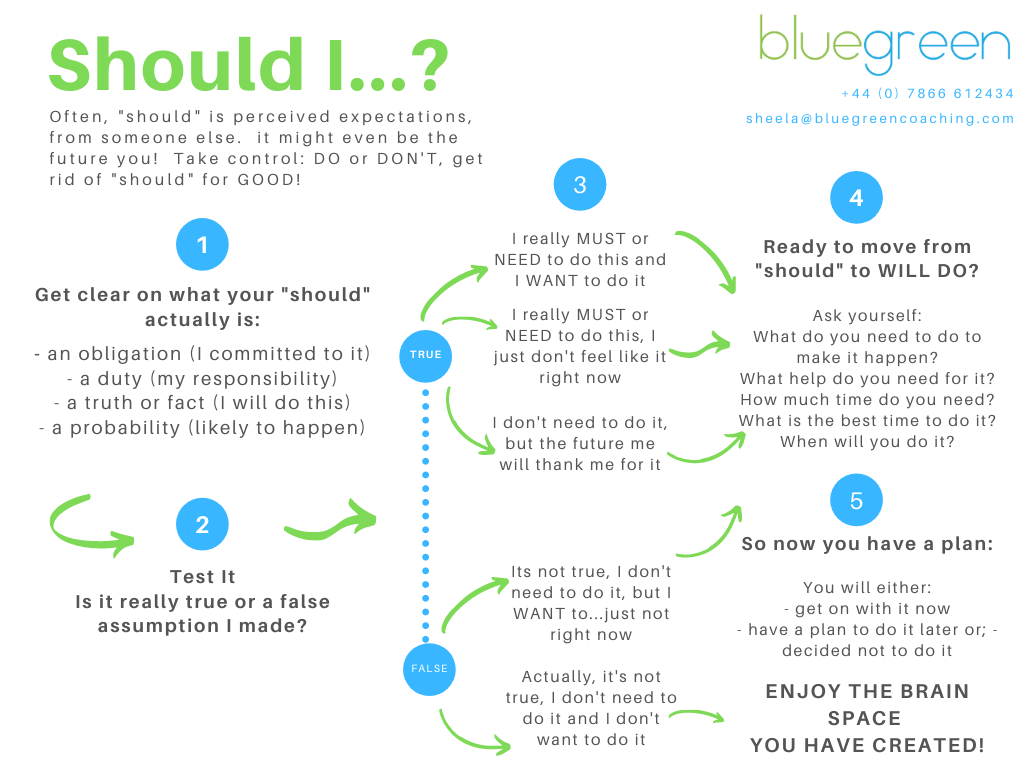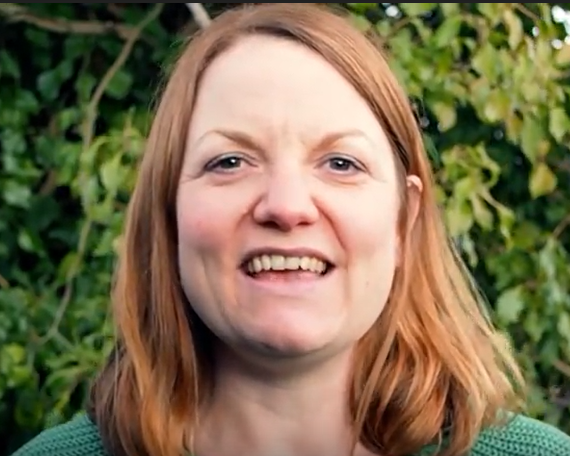As if a blog post could be about the word “should”!?
Take a moment to think though.
- How many “should”s do you put pressure on yourself with on a daily basis?
- To what extent do they weigh on your mind?
- How often do you ignore them?
- What is the result of doing, or not doing them?
- What is the impact on you, or others?
- And finally, where do they actually come from anyway?
Firstly, what inspired this post?
I set myself a target of writing a post to my website once a month. Until now, I think there have only been a couple of occasions where I hadn’t found a juicy topic I felt compelled to write about. It got to the end of the month, I cobbled something together and posted, proud of the date stamp it afforded me, but maybe not so proud of the content!
In conversation with a friend i heard the “should” word! “I really should go and write this months blog post, its nearly the end of May, but I can’t think of a topic…”. She asked “why don’t you write about that, the sense of need to do it?”.
Mulling it over, I thought actually, it is quite topical right now, so this month, inspired that conversation, I am writing about “should”. There are a lot of “should”s floating around right now actually (NOTE – this is written during the 2020 COVID19 lockdown!), here are some I know of :
I should…
- be able to home school my children (whilst setting up the iPad for them)
- learn a language, become an expert baker or have a Chelsea Flower show worthy garden (furloughed people!), but then turn the page in your book. (I’m not even furloughed but got the Babbel app to learn Spanish, pulled along with the tide – but will admit to doing nothing with it!).
- get fit or train for a 5k (whilst lounging around)
- eat healthily (whilst munching on the home-made bread you’ve been experimenting with)
- slow down and appreciate things more (like “others” are saying)
I could go on, I am sure where are many more.
What are some of yours? Where do they come from?
The question to be explored is; “should” according to who?
- Social media? Do we feel we “should” do what everyone else is posting about too?
- Future you? “I should go for a walk”, because future me knows that I will feel better afterwards
- Parents? I really should call my parents
- Society? It’s the way we do things, so I should too?
- Our own beliefs? We all have our own set of beliefs collected through our lives, which rarely get challenged, yet some, could be untrue.
Is it really any of these things?
What would “they” say if you chose NOT to do the thing you feel you “SHOULD” do?
How much does the answer bother you?
What it feels like…
Having reflected on this a little whilst writing this post I realised that there is a heaviness about feeling I “should” do something. On asking a couple of people what it really means, a definitive answer wasn’t forthcoming. I landed on “something you know is going to be worth it in the end, but there in that moment, you don’t feel like doing it“.
Depending on the task, once we do get on and complete it, there can be a sense of achievement, whilst equally we can feel deflated at the loss of time and effort.
What does it feel like to you?
Let’s look at what the dictionary says…to put a stake in the ground:
“indicate obligation, duty or correctness, typically when criticising someones actions” or “to indicate what is probable”.
Dictionary definition of “should”
The line “when criticising someones actions” is interesting. It definitely has a critical tone, as well as a sense of resentment towards the task in hand. In the case that started this post, I think I fit into the “duty and correctness” category. The belief I hold is that my website will look correct if there is a post every month, thus bringing a sense of duty to those that follow the blog. A “belief” behind that being that I thought regular updates were “expected”.
There wasn’t time to test out the truth of that, although now, as a “reader”, maybe you could confirm what the truth is?
Another element; “indicating what is probable” is intriguing too. In this way, are we using it as a procrastinators tool e.g. I really should go for a run? Right now, we don’t feel like it, but it is probable that it will happen later, so a way to put things off for a while!
Why would we want to do something about it?
The sense of resentment I mentioned earlier could be the key here. Take something you feel you “should do”, and maybe know you will have to at some point, but don’t really feel like maybe? Do you find you get tangled up in putting it off, even though you know you will do it later? OR, something we feel pressure to do, we can end up frittering a chunk of time in playing the pro’s and cons of it, when deep down we know the answer?
Both can consume a lot of brain space (which to note, could be used on other things we WANT to think about!). Again, I don’t know about you, but the should can be accompanied by a series of thoughts around “how can I get out of, or, around this?”, again, a lot of effort and thinking time, if we end up doing it anyway?!
What can we do about it? – 5 steps to try
- Cut into whether the “should” is:
- an obligation (I committed to doing this)
- a duty (it is my responsibility)
- a correctness (a fact or truth)
- a probability (it is likely to happen)
- Once you have defined the category, then ask, is this true?
- Not sure how to decide if something is true or not? Use your personal values, does it meet them? or ask does it fit in with my overall purpose? (Not clear on these? – get in touch, I can share some free tools to help, then of course there is coaching!)
- Research what it means if it is true or false, and whether you will or won’t do it (if you won’t, go directly to step 5!) Otherwise, move to the next step.
- Want to make it happen?
- What do you need to do to make it happen?
- What help do you need for it?
- How much time do you need?
- What is the best time to do it?
- When will you do it?
Now you have a decision and or, a plan, set that brain space free for the things you WANT to do

What’s the science behind this?
Our need for a Sense of control . Having the sense that we have personal control over situations has strong research backing its usefulness as a resilient tool which, when exercised has a positive impact on our well-being. So, taking charge of what we are choosing to do, is a perfect example of this in application
Values – having a sense of purpose or direction is another resilient tool, backed up with evidence of its impact on well-being. If we operate through a set of values that we believe to be important, we can live our lives in accordance with them, and thus feel we are meeting our own personal goals in life.
The sense of achievement linked to that is another measure of well-being.
“Should” is a word I often challenge people on when they come to coaching, and through exploring where the “should” has come from can open up a whole conversation around beliefs and assumptions. It enables people to raise their self-awareness on what they really want to do.
I hope this article has helped you remove a few “should” from your day and switch to “I will” or “I won’t” and be happy with your stance.

Sheela Hobden is a Coach at bluegreen Coaching. Following her own mental health battles, she now coaches individuals, runs training sessions and speaks at conferences. She has a real passion for helping medics and healthcare professionals take as much care of themselves as they do their patients in whatever life or career conundrums they face! She is also a Mentor Coach and Coach Supervisor. She has a PGCERT in Business and Personal Coaching, holds PCC member status with the ICF and is CIPD qualified. She challenges herself with ultra distance running and Ironman. Find her at www.bluegreencoaching.com or swimming in the sea, in Poole, Dorset
Get more ideas and tips by joining her newsletter tribe – sign up below!
Better still, book in to speak with her directly?
